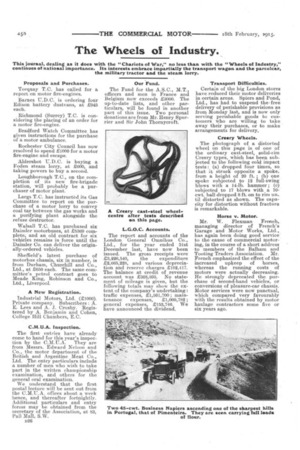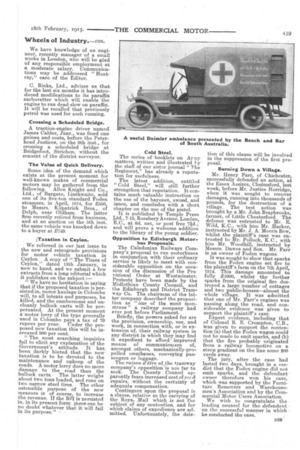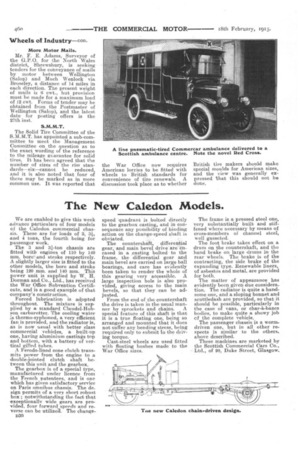The Wheels of Industry.
Page 10

Page 11

Page 12

If you've noticed an error in this article please click here to report it so we can fix it.
This joursal, dealing as it does with the "Chariots of War," no less than with the " Wheels of Industry," continues of national importance. Its interests embrace impartially the transport wagon and the parcelcar, the military tractor and the steam lorry.
Proposals and Purchases.
Torquay T.C. has called for a report on motor fire-engines.
Barnes r.D.C. is ordering four Edison battery dustvans, at 2945 each.
Richmond (Surrey) T.C. is considering the placing of an order for a motor fire-engine.
Bradford Watch Committee has given instructions for the purchase of a motor ambulance.
Rochester City Council has now resolved to spend 21000 for a motor fire-engine and escape.
Aldershot U.D.C. is buying a Foden steam lorry, at .2600, and taking powers to buy a second.
Loughborough. T.C., on the completion of its new fire-brigade station, will probably be a purchaser of motor plant.
Largs T.C. has instructed its Gas Committee to report on the purchase of a motor lorry to convey coal tar between the gas works and a purifying plant alongside the refuse destructor.
Walsall T.C. has purchased six Daimler motorbuses, at £5369 complete, and ail old contract for six vehicles remains in force until the Daimler Co. can deliver the originally-ordered vehicles.
Sheffield's latest purchase of motorbus chassis, six in number, is from Durham, Churchill and Co., Ltd., at 2650 each. The same committee's petrol contract goes to Meade King, Robinson and Co., Ltd., Liverpool.
A New Registration.
Industrial Motors, Ltd. (21000). Private company. Subscribers: A. E. Lees and A. J. Crosby. Registered by A. Benjamin and Cohen, College Hill Chambers, E.C.
C.M.U. A. Inspection.
The first entries have already come to hand for this year's inspection by the C.M.U.A. They are from Messrs. Edward Nelson and Co., the motor department of the British and Argentine Meat Co., Ltd. The entry particulars include a number of men who wish to take part in the written championship examination, and others for the general oral examination.
We understand that the first postal lecture will be sent out from the C.M.r.A. offices about a week hence, and thereafter fortnightly. Additional particulars and entry forms may be obtained from the secretary of the Association, at 83, Pall Mall: S.W.
026
Our -Fund.
The Fund for the A.S.C., MT., officers and men in France and Belgium now exceeds 23000. The up-to-date lists, and other particulars, will be found in another part of this issue. Two personal donations are from Mr. Henry Spurrier and Sir John Thornycroft.
L.G.O.C. Accounts.
The report and accounts of the London General Omnibus Co., Ltd., for the year ended 31st December last, have now been issued. The gross receipts were
£3,226,540, the expenditure 22,685,228, and various depreciation and reserve charges 2192,41.7. The balance at credit of revenue account was £368,895. No statement of mileage is given, but the following totals may show the extent of the company's undertaking : traffic expenses, £1,501,700; maintenance expenses, £1,009,782; general expenses, £153,746. We have announced the dividend. Transport Difficulties.
Certain of the big London stores have reduced their motor deliveries in certain areas. Spiers and Pond, Ltd., has had to suspend the free delivery of perishable provisions as from Monday last, and is now only serving perishable goods to customers who are willing to take away their purchases, or to make arrangements for delivery.
Creery Wheels.
The photograph of a distorted wheel on this page is of one of the ordinary cast-steel, solid-rim Creery types, which has been subjected to the following cold impact tests : (a) dropped four times, so. that it struck opposite a. spoke, from a height of 20 ft. ; (b) one spoke subjected to 12 full-swing blows with a 14-lb. hammer ; (c) subjected to 17 blows with a 10cwt. ball dropped 8 ft. on to rim un_ til distorted as shown. The capacity for distortion without fracture is remarkable.
Horse v. Motor.
Mr. W. Flexman French, managing director of French's Garage and Motor Works, Ltd., has again been doing good service. to the cause of commercial motoring, in the course of a short address to members of the Balham and Tooting Traders Association. Mr. French emphasized the effect of the increased upkeep of horses, whereas the running costs of motors were actually decreasing. He strongly deprecated the purchase of second-hand vehicles, or conversions of pleasure-car chassis. Motor services were now punctual, which compared very favourably with the results obtained by motor haulage contractors some five or six years ago.
Wheels of Industry.—con.
We have knowledge of an engineer, recently manager of a small works in London, who will be glad of any responsible employment at a moderate salary. Communications may be addressed "Beatray," care of the Editor.
C. Enka, Ltd., advises us that for the last six months it has introduced modifications to its paraffin carburetter which will enable the engine to run dead slow on paraffin. It will be recalled that previously petrol was used for such running.
Crossing a Scheduled Bridge.
A traction-engine driver named James Calder, Junr., was fined one guinea and costs, before the Peterhead Justices, on the 9th inst., for crossing a scheduled bridge at Bridgefoot, Strichen, without the consent of the district surveyor.
The Value of Quick Delivery.
Some idea of the demand which exists at the present moment for well-known makes of commercial motors may be gathered from the following. Allen Knight and Co., Ltd., of Bargate, Linthwaite, sold one of its five-ton standard Foden steamers, in April, 1914, for £550, to Messrs. Kilpatrick Bros., of Delph, near Oldham. The latter firm recently retired from business, and at an auction on the 6th inst. the same vehicle was knocked down to a buyer at £140.
LTaxation in Ceylon.
"We referred in our last issue to the new and retrograde provisions for motor vehicle taxation in Ceylon. A copy of "The Times of Ceylon,"• dated 13th January, is now to hand, and we submit a few extracts from a long editorial which it publishes on the subject :— " We have no hesitation in saying that if the proposed taxation is persisted in, motor haulage in Colombo will, to all intents and purposes, be killed, and the cumbersome and uncleanly bullock carts will be perpetuated. At the present moment a motor lorry of the type generally used in Colombo pays a tax of 70 rupees per year. Under the proposed new taxation this will be increased 900 per cent. "The most searching inquiries fail to elicit any explanation of the Government's attitude. It has been darkly hinted that the new taxation is to be devoted to the maintenance and upkeep of the roads. A motor lorry does no more damage to the road than the bullock carts. The latter weighs about two tons loaded, and runs on two narrow steel tires. The other ostensible purpose of the new measure is of course, to increase the revenue. If the Bill is ppraisted in, in its present form_ _ttere can be no fail doubt whatever that it will fa its ts purpose." • • Cold Steel.
The series of booklets on Arny matters, written and illustrated Isy the staff of our sister journal " The Regiment," has already a reputation for usefulness.
The latest addition, entitled "Cold Steel," will still further strengthen that reputation. It contains much valuable instruction on the use of the bayonet, sword, and lance, and concludes with a short chapter on the use of the pistol.
It is published by Temple Press Ltd., 7-16, Rosebery Avenue, London, E.C., at 6d. net, or post free and will prove a welcome addition to the library of the young soldier. Opposition to Edinburgh Motorbus Proposals.
The Caledonian Railways Company's proposal to run motorbuses in conjunction with their ordinary service is likely to meet with considerable opposition on the occasion of the discussion of the Provisional Order at Westminster. Protests have been made by the Midlothian County Council, and the Edinburgh and District Tram4 way Co. The chairman of the latter company described the proposition as "one of the most monstrous" a railway company had ever put before Parliament.
Briefly, the powers asked for are the provision, ownership, use, and work, in connection with, or in extension of, their railway system in any district in which they may find it expedient to afford improved means of communication of, amongst others, mechanically-pro-, pelled omnibuses, conveying passengers or luggage. The raison d'être of .the tramway company's opposition' is nob far to seek. The County Council apparently fears increased cost of road repairs, without the certainty of adequate compensation. Contingent upon the proposal is a clause, relative co the carrying of the Roya. Mail which is not the subject of any contention, and for which claims of expediency are admitted. Unfortunately, the dele
tion of this clause will be involved in the suppression of the first proposal.
Burning Down a Village.
Mr. Henry Farr, of Chichester, successfully defended an action, at the Essex Assizes' Chelmsford, last week, before Mr. Justice Horridge, when it was sought to recover damages, running into thousands of pounds, for the destruction of a village. The test action was brought by a Mr. John Braybrooks, farmer, of Little Chesterford. The defence was entrusted to Mr. E. Wild, K.C., with him Mr. Harker, instructed by Mr. J. A. Morris Bew, aidailst the plaintiff's case was entrusted to 3/Ir. Pollock, K.C., with him Mr. Woodhill, instructed by Messrs. Dawes and Son. Mr. Farr is an owner of Foden wagons.
It was sought to show that sparks from the Foden engine set fire to the plaintiff's farm on the 7th April, 1914. This damage amounted to fully 21000, whilst the further sparks from the original fire destroyed a large number of cottages and two public-houses—almost the whole village. It was admitted that one of Mr. Farr's engines was passing along the road, and considerable evidence was given to support the plaintiff's case. Expert evidence, including that of Colonel R. E. Crompton, C.B., 'was given to support the contention (a) that the Foden wagon could not be made to emit sparks, and (b) that the fire probably originated from a railway locomotive on a steep gradient on the line some 200 yards away. The jury, after the case had lasted two days, brought in a verdict that the Foden engine did not emit sparks, and the defendant owner therefore won his case, which was supported by the Furniture Removers and 'Warehousemen's Association and by the Commercial Motor Users Association.
We wish to congratulate the leading counsel for the defendant on the successful manner in which he eonducted the case.
Wheels of Industry—con.
More Motor Mails.
Mr. F. E. Adams, Surveyor of the G.P.O. for the North Wales district, Shrewsbury, is seeking tenders for the conveyance of mails by motor between Wellington (Salop) and Much Wenlock via Broseley, a distance of 14 miles in each direction. The present weight of mails is 6 cwt., but provision must be made for a maximum load of 12 cwt. Forms of tender may be obtained from the Postmaster of Wellington (Salop), and the latest date for posting offers is the 27th inst.
The Solid Tire Committee of the S.M.M.T, has appointed a sub-committee to meet the Management Committee on the question as to the exact wording of the reference to the mileage guarantee for solid tires. It has been agreed that the number of sizes of the rim standards—six--cannot be reduced, and it is also noted that four of these may be marked as in more common use. It was reported that the War Office now requires American lorries to be fitted with wheels to British standards for convenience of tire renewals. A discussion took place as to whether British tire makers should make special moulds for American sizes, and the view was generally expressed that this should not be done.




















